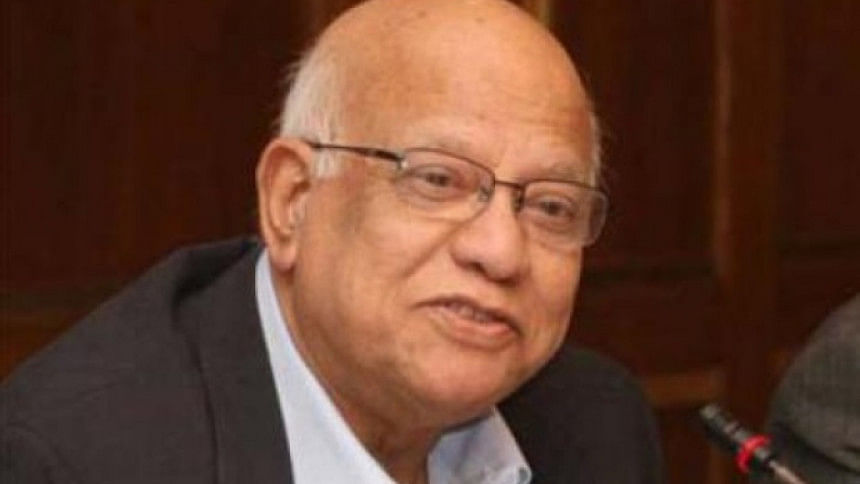Muhith forecasts an end to 6pc growth trap next year

Bangladesh will come out of the 6 percent GDP growth trap next fiscal year as the prevailing political stability looks set to continue, Finance Minister AMA Muhith said yesterday.
The economic growth target of 7 percent for fiscal 2015-16 will be achieved, Muhith said in his wrap-up speech on the budget in parliament.
The different international organisations, including the World Bank, have been stressing just one obstacle to achieving the targeted GDP growth: political instability.
"I think it will not be entirely unreasonable to hope that the current political stability will continue, as good sense will prevail among the related parties for the greater welfare of the country."
"So achieving 7 percent growth is not an impossible or unrealistic dream for Bangladesh."
The growing rural economy, the remittance inflow and the increased income of the middle-class as a result of the new pay scale will create more demand for domestic economy, Muhith said.
Besides, there is a positive outlook in the external sector, so the targeted GDP can be achieved, he said.
About criticisms regarding the budget size, which many deem to be too ambitious, he said the national outlay increased fourfold between fiscal 2008-09 and 2013-14.
In keeping with the trend, the budget for fiscal 2015-16 was increased.
The government managed to implement 91 percent of the budget on average from fiscal 2008-09 to fiscal 2013-14, according to the finance minister. Earlier, the implementation was 80 to 85 percent.
But this year and the next, the implementation will be more than 95 percent, Muhith said.
Various steps have been taken to effectively implement the annual development programme, as a result of which the government will succeed in implementing the Tk 100,000 crore ADP taken for next fiscal year.
Replying to criticism from various quarters about the budget deficit, Muhith said it has been kept at 5 percent of GDP, which is less than in other Saarc countries.
In India, the budget deficit is 7.2 percent, in Sri Lanka 5.9 percent and in Maldives 10.6 percent.
"Compared with other Saarc countries, Bangladesh's budget deficit is still very low."
However, Muhith admitted that the allocations to the education and health sectors did not increase in proportion to the size of budget in the last few years.
The overall development of the country is not possible without the development of the energy and transport sectors, he said.
Subsequently, the topmost priority was given to the energy sector: its allocation was almost doubled to Tk 18,540 crore for next fiscal year.
Four of the eight fast-track projects are from the transport sector. The projects are: the Padma Bridge project, Dhaka mass rapid transit development project, Paira sea port and Sonadia deep sea port.
Some Tk 27,801 crore, which is 8.8 percent of the budget, has been allocated to improve the communication infrastructure sector next fiscal year.
About the government's plan of action to improve efficiency and create jobs, Muhith said a national skill development authority will be formed and a fund created for it.
Other than this, the finance ministry will introduce the Skills for Employment Investment Programme to generate more jobs at home and abroad, Muhith added.

 For all latest news, follow The Daily Star's Google News channel.
For all latest news, follow The Daily Star's Google News channel. 



Comments